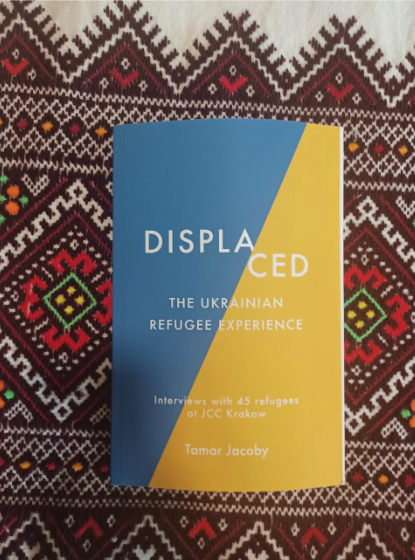by Nicole Yurcaba

In 2022’s early days after Russia launched a full-scale invasion on Ukraine, millions of refugees fled their homeland, pursuing safety in countries such as Poland, Germany, Moldova, Romania, Canada, the UK, and the United States. In the pages of Displaced: The Ukrainian Refugee Experience, Tamar Jacoby collects the stories of 45 refugees who found themselves in Krakow, Poland at the Jewish Community Centre. As the war in Ukraine fades from western headlines and a volatile political environment in the US threatens future support for aid to Ukraine, Jacoby’s book reminds readers that human lives are the true cost of war. Brief and accessible, Displaced: The Ukrainian Refugee Experience elevates the stories of the young, the elderly, the disabled, and the well-educated who found themselves at the mercy of strangers’ kindness in a foreign land.
In Jacoby’s book, readers meet refugees like twin sisters Valentyna and Iryna, who venture to Lviv, Ukraine and eventually to Krakow in order to escape the war in Mykolaiv, Ukraine. They also meet Valery, an HVAC technician who made the difficult choice to leave Ukraine with his paralyzed, epileptic wife. Valery and his wife managed to escape Bucha after a “passing tank shot at his car” and “a soldier shot at him.” Eventually, readers meet Nadya and Yulia, who “knew each other growing up in Dnipro,” and after crossing into Moldova and eventually Romania, ventured to Krakow. Nonetheless, for both of them “Ukraine beckons.” In each vignette, a love for homeland and a devotion to family shines, and readers feel an intimacy with Ukraine that news blurbs and headlines fail to capture.
Displaced also encompasses aspects of the entire refugee experience, including the responses of those volunteers in Krakow who worked tirelessly to accommodate the influx of refugees from across the border. Jacoby focuses on how JCC helped Jews and non-Jews alike. In this, the book echoes other texts like Marina Sonkina’s Ukrainian Portraits, which seamlessly fuses refugee and volunteer stories. The other reason Displaced is an effective overview of what refugees experienced upon arrival at JCC is that volunteers like Jacoby do not dwell on their own contributions. Rather, the focus turns to how all volunteers collaborated and worked together in order to ease the refugees’ transition into a new country.
The book also focuses on Poland’s national solidarity with Ukraine in the few short days after the full-scale invasion. This solidarity is detailed in the refugees’ segments, colorful photographs of blue-and-yellow shop doors and school bulletin boards bearing messages for new students in Ukrainian. Photographs of the interviewees also accompany the narratives. Thus, readers can see the interviewees as actual people whose lives were quickly overturned on the morning of 24 February 2022. This added layer of humanity makes the book even more immediate and necessary, especially as far-right rhetoric and propaganda continues to demonize Ukrainians across the globe.
Of course, uncertainty proliferates nearly every story in the book. Young academics like Ganna and Hryhorii share Ganna’s heartbreaking story of being displaced twice—first in 2014 when Ganna left Crimea and again in 2022. Ganna manages to work remotely as a graphic designer, but she and Hryhorii have postponed their wedding, as they are “‘not sure it’s appropriate to celebrate.’” Others, like Ulyana, bought tickets for herself and her siblings and boarded a train “they expected to never leave Ukraine.” Aleksandr from Kharkiv, a single father of a 13-year old daughter, escaped without “any significant trauma or anxiety as a result of their wandering.” Aleksandr and his daughter both embrace the possibilities, despite the future’s opaqueness: “‘There are many possible options… I’m not rejecting any of them.’” Despite the individual—even national—uncertainty, Ukrainian fortitude shines and prevails.
Displaced offers readers small slivers of hope that they can carry with them in order to teach others not only about the Ukrainian situation, but also about the power of empathy and compassion. In a world ravaged by brutality and vindictive behavior, Displaced offers readers the hope that perhaps, just maybe, kindness can be paid forward and potentially change the world. Its interviews remind readers that their actions do actually have the power to change others’ lives—especially during times of extreme duress.
Nicole Yurcaba (Ukrainian: Нікола Юрцаба–Nikola Yurtsaba) is a Ukrainian (Hutsul/Lemko) American poet and essayist. Her poems and essays have appeared in The Atlanta Review, The Lindenwood Review, Whiskey Island, Raven Chronicles, West Trade Review, Appalachian Heritage, North of Oxford, and many other online and print journals. Nicole teaches poetry workshops for Southern New Hampshire University and is a guest book reviewer for Sage Cigarettes, Tupelo Quarterly, Colorado Review, and The Southern Review of Books.



Add your first comment to this post